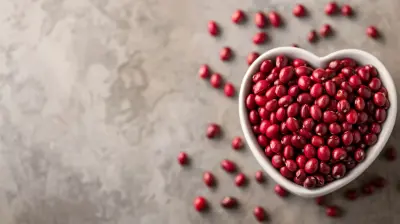Inflammation and Heart Disease: What You Can Do to Control It
29 June 2025
Brace yourself, friend. We’re about to take a deep (and slightly snarky) dive into one of the most underappreciated, behind-the-scenes villains of modern health: inflammation. Yep, the same thing that causes your ankle to puff up like a beach ball after you twist it during your aunt's Zumba class is also the sneaky saboteur messing with your heart. And spoiler alert—it’s not just about fried food and zero gym time. Shocking, I know.
Let's unpack this mess, one sarcastically informative step at a time, and figure out how to show inflammation the exit door—before it declares war on your heart.
What Even Is Inflammation, Anyway?
Alright, let’s start with the basics. Inflammation is your body's way of saying, “Hey! Something’s not right here!” It's actually a good thing when it's doing its job properly (like kicking germs to the curb or helping wounds heal). But when it's lurking around longer than your in-laws after Thanksgiving dinner—oh boy, that’s when the trouble starts.There are two types of inflammation:
- Acute Inflammation: Quick, dramatic, and helpful. Think of it as your body's own fire department rushing in to save the day.
- Chronic Inflammation: The drama queen that never leaves. This one simmers quietly, messing things up from the inside—and making your heart the primary target.

Wait, What Does This Have to Do with My Heart?
Oh, just everything. Chronic inflammation has been linked to a higher risk of heart disease, and not in a "cute conspiracy theory" kind of way. We’re talking full-blown, backed-by-science proof.Here’s how it works: Chronic inflammation leads to the build-up of plaque in the arteries (yep, those vital tubes that carry blood to and from your heart). This plaque can eventually rupture, causing blood clots, and guess what? That means a heart attack or stroke. Cool, huh? (Spoiler: Not cool.)

The Usual Suspects: What Causes Chronic Inflammation?
Let’s play Clue. It's not Colonel Mustard in the library with the candlestick. It's more like:- Processed foods (your beloved frozen pizza is looking shady)
- Smoking (your lungs aren’t the only ones mad at you)
- Sedentary lifestyle (Netflix binges, I’m looking at you)
- Chronic stress (because adulting is exhausting)
- Excess alcohol intake (no, your red wine isn’t a health food if you’re guzzling it like water)
- Poor sleep (beauty sleep isn’t just for looks, darling)

Signs That Inflammation Might Be Taking Over
You won’t get a “Congrats! You have chronic inflammation!” text message, but your body is probably throwing you some not-so-subtle hints:- Constant fatigue (despite 3 cups of coffee before noon)
- Frequent infections
- Joint pain or stiffness
- Digestive issues (because, apparently, your gut has opinions too)
- Skin problems (hello, mysterious breakouts)
Now, if you're checking more boxes than a Buzzfeed quiz, don’t panic. But do read on.
How Inflammation and Heart Disease Are BFFs
Let’s break this down.Inflammation doesn’t cause clogged arteries directly. Instead, it’s like the toxic friend encouraging plaque to stick around longer than it should. Once inflammation joins the party, it weakens the artery walls, makes plaque unstable, and before you know it—bam—a heart attack.
Chronic inflammation also:
- Raises your blood pressure (your heart’s version of stress)
- Increases insulin resistance (diabetes, anyone?)
- Disrupts cholesterol levels (yep, even the “good" cholesterol gets confused)
Bottom line? If you want to keep your heart ticking like a Swiss watch, controlling inflammation is mission freakin’ critical.
What You Can Actually Do to Control It
Okay, enough gloom and doom. You’re here for the good stuff—the how-to, the game plan, the Life-Without-Heart-Disease Starter Pack.1. Eat Real Food (Your Great-Grandma Would Approve)
Let’s be real. If it comes in a box with a cartoon character on it, it’s probably not inflammation-friendly. You want foods that are colorful, whole, and preferably don’t expire in 2030.Anti-inflammatory Superstars:
- Fatty fish (salmon, sardines—don’t make that face)
- Leafy greens (kale, spinach, arugula—you knew that was coming)
- Berries (nature's candy, minus the cavities)
- Nuts and seeds (almonds, walnuts, flaxseeds, and their snackable cousins)
- Olive oil (ditch the vegetable oil, it's a trap!)
- Turmeric and ginger (because your spice rack deserves a glow-up)
Basically, if it looks like something that grew or swam, you're golden.
2. Move That Body, Boo
Yes, yes—you’re busy. Aren’t we all? But your heart doesn’t care about your Netflix queue or 86 unread emails.Exercise doesn’t mean training for a marathon or becoming a CrossFit beast. Just get your body moving. Walk. Dance. Do yoga. Chase your dog. Heck, even vacuuming counts (bonus: clean house).
Aim for: 30 minutes of moderate activity most days. And no, walking to the fridge doesn’t count.
3. Prioritize Sleep Like It's a Spa Day
Sleep isn’t for the weak—it’s for the wise. Chronic inflammation loves a sleep-deprived body because your immune system gets cranky without rest.Stick to a consistent schedule. Kick your phone out of bed (it’s not doing your melatonin levels any favors), and make your room a zen den.
4. Slay That Stress (Or at Least Manage It)
If stress burned calories, we’d all be runway models by now, right? But alas, stress—a.k.a. the never-ending to-do list in your brain—actually stokes the flames of inflammation.Time to find your zen:
- Meditate (before you roll your eyes, try it)
- Breathe deeply (yes, really—inhale, exhale… see?)
- Journal
- Take breaks
- Laugh (often, loudly, and preferably at bad puns)
5. Quit Smoking (Seriously, Just Quit)
There’s no “but I only smoke socially” clause here. Smoking is one of the fastest ways to invite inflammation and heart disease to your life. There’s no sugar-coating it—if you smoke, your heart is in trouble.Need help quitting? It’s out there. Therapies, nicotine replacement, support groups. Ask, Google, beg, whatever it takes—just don’t light up.
6. Limit the Liquid Courage
Sorry to the “heart-healthy wine” crowd: there's a point of diminishing returns. A glass here and there is fine (cheers!), but if your evenings look like a vineyard tour, inflammation is probably on the guest list.Stick to moderation: one drink a day for women, two for men. No, you can’t stockpile your drinks and have them all on Saturday.
Testing for Inflammation: Because Google Can’t Diagnose You
If you're wondering whether your body’s inflamed, there are actual tests for that. Your doctor can order blood work like:- C-reactive protein (CRP): The higher it is, the more likely you're inflamed.
- ESR (Erythrocyte Sedimentation Rate): Measures how quickly your red blood cells settle—faster = more inflammation.
- IL-6, TNF-alpha: If you really want to nerd out
Don’t skip the annual checkups, okay? That’s not adulting. That’s survival.
Medications: The Last Resort (But Sometimes Necessary)
Let’s get one thing straight: if your doctor tells you meds are necessary—listen. But wouldn’t it be nice to try lifestyle changes before jumping on the pharmaceutical carousel?That said, some meds that help reduce inflammation (under supervision):
- Statins (yes, they’re for cholesterol, but also help with inflammation)
- NSAIDs (ibuprofen, naproxen—but long-term use comes with baggage)
- Immunosuppressants (usually for autoimmune conditions)
Again—make these calls with a real doctor, not TikTok.
Let’s Wrap This Inflammatory Saga Up
So. Inflammation + heart = not a love story you want to be part of.But you're not helpless. Nope, not even close. You’ve got choices, and every little effort adds up. Eat better, move more, sleep tighter, stress less. Easy? Not always. Possible? Absolutely.
And hey, if you needed a sign to start treating your body like it's the only one you’ve got—that sign just yelled at you for 1800+ words.
Now go take care of that heart. It’s been beating for you since day one.
all images in this post were generated using AI tools
Category:
Heart HealthAuthor:

Eileen Wood
Discussion
rate this article
1 comments
Zeno Reyes
This article effectively highlights the crucial link between inflammation and heart disease. Practical tips for managing inflammation, like diet and lifestyle adjustments, empower readers to take control of their heart health. A must-read for anyone concerned about cardiovascular well-being!
July 12, 2025 at 3:32 AM

Eileen Wood
Thank you for your insightful feedback! I'm glad you found the article helpful in understanding the connection between inflammation and heart disease. Your emphasis on practical tips is much appreciated!


